
Salute to Vets and Survivors
• Step Up The Organized Resistance to War and Reaction
• Bring
Troops and Survivors Home Now
• Marchers Speak Out
Katrina Survivors
• Appeal for Status as Internally Displaced Persons
For Your Information
• UN Guiding Principles on Internal Displacement
Global Women's Strike 2006, U.S. & Worldwide
• Mothers, Daughters,
Sisters, Wives: Fighting for Our Loved Ones' Lives
March 18-19 Anti-War Actions

![]()
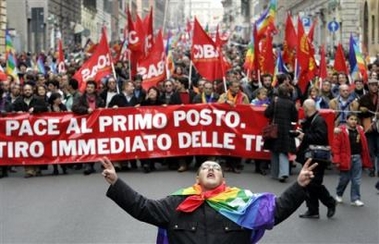
![]()

![]()
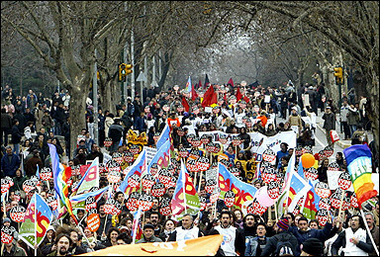

![]()
![]()
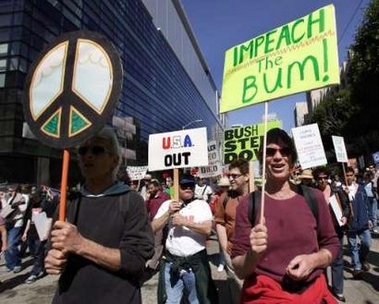
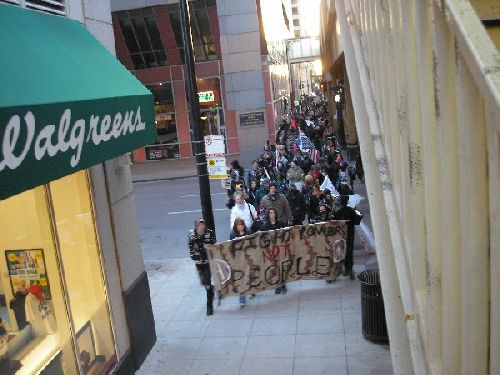
![]()
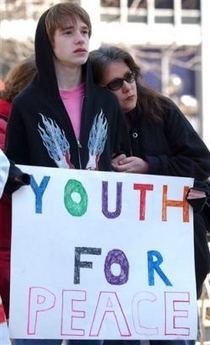

![]()
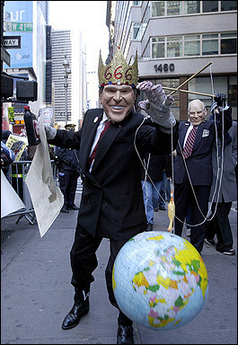
From left to right: London, England; Rome, Italy; Madrid, Spain; Istanbul, Turkey; Sydney, Australia; San Francisco, California; Chicago, Illinois; Trafalgar, Indiana; Boston, Massachusetts; New York City
![]()
Salute to Vets and Survivors
Step Up The Organized Resistance to War and Reaction
Across the country and worldwide, peoples everywhere are taking their stand against imperialist war and Bush reaction. Humanity is rising with one voice End the Iraq War Now! Another World Is Possible! The U.S. Marxist-Leninist Organization salutes everyone, everywhere, taking their stand for humanity. We salute the many thousands in the U.S. standing up for the rights of all, the rights of Iraqis, the rights of Katrina survivors, the rights of immigrants, the rights of all.
The "Walkin' to New Orleans" action, bringing together Katrina survivors, military families, veterans, political, community and religious activists is also bringing to the fore the central role of the battle unfolding in New Orleans and the Gulf Coast. The brutality, impunity and failure of the U.S. state, in Iraq and the Gulf Coast is clear for all to see. So too is the stand of the people to take matters into their own hands. The march itself, the organizing yet again for students to come to New Orleans to join the rebuilding, the stand to set up health clinics and reconstruction and communications centers all show that the people are taking up the task to create another world where we decide.
The battle being waged in New Orleans is one that will be indicative of how things will go. The government, in its failure, is seeking to impose fascist arrangements. Its refusal to go forward to a democracy that empowers the people to govern and decide necessarily means it is going backward to the genocide and slavery that characterized its founding. People are to be denied any rights, to suffer a civil death, with their homes stolen, their public schools eliminated, their voting rights denied, their very right to be, challenged. This is what the government has in store.
But let there be no doubt that resistance by the people is growing and being strengthened. The battle is engaged. The heart of New Orleans, which is its spirit of resistance, beating without let up from Congo Square, is sounding the charge. Let all join together to insure the success of the people in this battle!\
[TOP]
Veterans and Hurricane Survivors Demand
Bring Troops and Survivors Home Now
March 3, 2006 -- Veterans For Peace, Iraq Veterans Against the War, Vietnam Veterans Against the War, Military Families Speak Out, and Gold Star Families for Peace -- national organizations demanding a U.S. withdrawal from Iraq -- will march for 5 days with hurricane survivors along the Gulf Coast, ending with a rally in New Orleans on the third anniversary of the U.S. invasion of Iraq. Beginning in Mobile on March 14 at the historic Stone Street Baptist Church, veterans and survivors are demanding not only an end to the Iraq war, but a large increase in resources to the Gulf Coast.
On March 15, the second day of the march, FEMA is planning to evict tens of thousands of hurricane survivors in Louisiana and Mississippi. Marchers are calling for immediate appropriate housing for those already evicted and those still in hotels, and an end to evictions. "If we can build cities in the desert to wage war, why can't we rebuild the cities of the Gulf Coast for justice?" asks Paul Robinson, president of the Mobile chapter (#130) of Veterans For Peace.
For months now, since Hurricane Katrina devastated the coastlines of Louisiana, Mississippi, and Alabama, Robinson has been heavily involved in relief and reconstruction efforts, with little response from the federal government. Robinson put out a call for national antiwar organizations to come to the Gulf Coast to "make the connection between an illegal war approaching a half a trillion dollars and the negligence of the administration in addressing the needs of disaster victims."
Like returning veterans who have seen their benefits slashed, their post-traumatic war stress ignored and denied, and their hospitals closed down and jobs eliminated, communities of hurricane survivors have been experiencing a heavy increase in suicide, an 80 percent increase in alcohol sales in effected neighborhoods, disenfranchisement of their voting rights, and paltry medical care. FEMA is also refusing survivors any information on how to contact dispersed family members and loved ones.
"Dr. King once said that every bomb dropped over Vietnam explodes in Harlem," says Vivian Felts, director of the Mobile-based hurricane relief organization Saving Our Selves (SOS). "We are saying that every bomb released over Iraq is exploding from Mobile to New Orleans. And that's where we are walking."
Dave Cline, who was drafted into the Vietnam War in 1967, and awarded three Purple Hearts, a Bronze Star for bravery, and the Combat Infantryman Badge, will also be participating on the march. President of Veterans For Peace, Cline said, "There are two simultaneous crimes being committed here, and we're going to highlight the single perpetrator." The "Walkin' to New Orleans" coalition that is planning the five-day event, estimates that 150 veterans, military family members, and hurricane survivors and relief workers will participate in the 137-mile march.
See www.VetGulfMarch for a listing of the route and other details on the march. Veterans and survivors are available for pre-interviews, please contact Paul Robinson at 443-996-5915.
[TOP]
Walkin' to New Orleans
Marchers Speak Out
We walked through Biloxi and Gulfport to Long Beach, Mississippi, on our way to New Orleans today. We hadn't seen much devastation until now, but these towns were some of the hardest hit. It dawned on me as we walked that I knew these areas. I spent three months at Keesler AFB in Biloxi for training after commissioning in the Air Force and lived for most of the time on Hwy 90 across the street from the gulf.
When we walked by the hotel today, I remembered Biloxi as it was. The coastal strip had been booming in 1998. Biloxi and Gulfport had both found some tourist trade; jobs opened up, people visited, stayed, and spent money. The cities had cleaned up the beaches so that they were at least walkable. It was not a wealthy area, but clearly a destination for many.
There is nothing there now, nothing. The hotel I stayed in is an empty shell, more of a skeleton than a building. Across the street there were no buildings, no restaurants or shops that I used to visit. All of it was destroyed; not a single business of hundreds survived, not the local shops, not the corporate chains. We could hardly walk on the side of the street with all the debris and sand. To our left was the gulf, to our right, the remains of a town. We saw people driving on the road, but very little work happening on the buildings. It was as if nobody could even find the strength to demolish the buildings that were already half-crushed by wind and waves.
This is the devastation I saw in my head as I watched the military build-up to the Iraq war. I knew that in war-ravaged countries, there are no jobs to be had; there is no discrimination between big house and little house, between school building and warehouse. The bombs are never that smart. This is why I refused to go to Iraq, because I saw what would happen to the people of Iraq; I knew from my studies of war that the innocent suffer the most, that the poor are the ones who never recover. I stood in protest as a conscientious objector in November of 2002 saying I would not be a part of death and destruction, that no cause, no fear for our own security can excuse our willful devastation of another country.
Our country still bombed the citizens of Iraq. When it came time to reconstruct our own country from a natural disaster nobody could stop, we pretend it doesn't matter. America has largely ignored this area; we have left it looking like a combat zone, with the sides of buildings sheared off as if from a bomb.
Our priorities are so off that we will spend money to destroy someone else's country and refuse to take care of our own when it needs help. This area cannot stand up again without our help. We must open our eyes to the destruction both that we have caused and that we have refused to fix.
Stephen Potts
Iraq Veterans Against the War
March
16, 2006
Crossing the Gulf
Night after night, we are able to camp, due to the hospitality of the black churches, which were the foundation of the rescue efforts within these communities. Night after night, we attend their church services, sitting side by side with those people that the police advised our groups not to send relief supplies to. These are the people -- "those people" as the police told Vivian, when she tried to deliver food and water to neighborhoods in Gulfport -- who were so dangerous that relief workers were warned not to even enter their neighborhoods, and if they did, keep their cars locked at all times.
These are the people who lost everything, who were left to drown in their attics, who are donating food and cooking dinner for us, in preparation for our visits. Tonight we were given chicken, pork, peas, cabbage, cornbread, beans, key lime pie, cakes, and a place to rest our heads. Tonight we were invited to join their services, to listen to their music and their preaching, and they listened while our walkers talked about the frustration of sitting at Fort Hood in a National Guard unit, not being allowed to provide help to the Gulf area. About 40 percent of the National Guard units -- as well as their equipment -- were overseas in Iraq.
People listened to the frustration of watching guard units being used in New Orleans to guard warehouses of Mardi Gras beads against looters, instead of providing relief to "those people." They listened to a father talk about his son, who had stood next to National Guard members filling sandbags as their own town's river had flooded, and was inspired by them to join the guard. And then was killed in Iraq, rather than being able to stay in the U.S. protecting our own communities.
When it was time for the offering, I realized my wallet was in my other pants, in my car. The woman next to me had two dollars in her hand for the plate. She pressed them into mine, for me to add to the plate, and gave me a huge hug.
It is a humbling experience to accept money from a person who has lost so much. These are the people the police were afraid of. These are "those people." I knew before leaving home that the purpose of this trip was to cross the gulf, but I didn't understand until we started walking, exactly which gulf we were crossing.
Audrey Mantey
Veterans for Peace
March
16, 2006
When one thinks of the anti-war movement, Prichard, Alabama is not the first place that comes to mind. But that is exactly where the Veterans' and Survivors' March to New Orleans is kicking off. I arrived in New Orleans in the afternoon of March 13 and drove through the ravaged Gulf Coast to Prichard. The extent of the damage along Interstate 10 was unbelievable and the lack of reconstruction was astonishing.
For several miles at a time rows of homes could be seen with ripped open roofs and smashed windows. It seemed as if the area was abandoned and from what I hear local residents saying it was indeed. FEMA has been slow to respond to this disaster and six months after Katrina stuck it is difficult to see if anything at all has been done to restore the people of this area back to their communities.
When I arrived in Prichard a press conference was underway. Afterward members of the media conducted individual interviews with veterans and survivors. As more marchers arrived there were hugs all around with Vietnam vets coming up to Iraq vets with greetings and praise. Local Alabamans and relief workers mingled with veterans and family members smiling and hugging people they had just met. The vibe here is incredible! I feel like this is going to be an historic event. My heart is full with joy when I think about how far people came for this to show their solidarity with the people of the Gulf Coast and our service embers overseas. Bring the troops home now! Rebuild the Gulf Coast!
Jose Vasquez
Iraq Veterans Against the War
March 13, 2006
[TOP]
Katrina Survivors
Appeal for Status as Internally Displaced Persons
The US Human Rights Network, in response to the devastation and displacement caused by Hurricane Katrina and further exacerbated by Hurricane Rita, has initiated a national campaign that calls on the United States government to recognize Katrina survivors as Internally -Displaced Persons (IDP) and to respect and adhere to the Guiding Principles on Internal Displacement. They are also calling for organizations to join us in the struggle for recognizing the importance of the IDP framework and ensuring the human rights of those misplaced are safeguarded by local, state and national authorities.
There are more than 25 million people around the world that have been displaced by either natural or human induced disasters. The survivors of Hurricane Katrina should be offered no less international attention and protection than other IDPs. Today the Human Rights Network is presenting their plea to the world.
In order to protect human rights, it is crucial for everyone in the U.S. to demand that Katrina survivors be recognized as IDPs.
The petition reads as follows:
ï We call on the United States Government to acknowledge the legitimacy of the category of internal displacement and assume the responsibilities delineated in the "Guiding Principles of Internal Displacement";
ï We call on the United States Government to recognize Hurricane Katrina Survivors as internally displaced persons;
ï We call on the United States Government to extend those protections afforded to internally displaced persons as delineated by the Guiding Principles on Internal Displacement;
ï We Call on the United States Government to develop a comprehensive domestic strategy, similar to its international framework, to ensure accountability and evaluation of the efficacy of programs and aid related to internally displaced persons in the United States;
ï Furthermore, we call on the United States Government to ensure that assistance and protection are extended throughout the duration of the crisis.
And finally, we appeal to the international community, particularly the United Nations and the Representative of the Secretary General on Human Rights of Internally Displaced Persons, to recognize Hurricane Katrina survivors as internally displaced persons and to ensure that U.S. national authorities respect and adhere to the spirit of the Guiding Principles on Internal Displacement.
To show your support sign the Petition! www.form-mail.com/secure/8681_Katrina.htm
[TOP]
For Your Information
UN Guiding Principles on Internal Displacement
Introduction: Scope And Purpose
1. These Guiding Principles address the specific needs of internally displaced persons worldwide. They identify rights and guarantees relevant to the protection of persons from forced displacement and to their protection and assistance during displacement as well as during return or resettlement and reintegration.
2. For the purposes of these Principles, internally displaced persons are persons or groups of persons who have been forced or obliged to flee or to leave their homes or places of habitual residence, in particular as a result of or in order to avoid the effects of armed conflict, situations of generalized violence, violations of human rights or natural or human-made disasters, and who have not crossed an internationally recognized State border.
Section I - General Principles
Principle 1
1. Internally displaced persons shall enjoy, in full equality, the same rights and freedoms under international and domestic law as do other persons in their country. They shall not be discriminated against in the enjoyment of any rights and freedoms on the ground that they are internally displaced.
Principle 3
1. National authorities have the primary duty and responsibility to provide protection and humanitarian assistance to internally displaced persons within their jurisdiction.
2. Internally displaced persons have the right to request and to receive protection and humanitarian assistance from these authorities. They shall not be persecuted or punished for making such a request.
Principle 4
1. These Principles shall be applied without discrimination of any kind, such as race, color, sex, language, religion or belief, political or other opinion, national, ethnic or social origin, legal or social status, age, disability, property, birth, or on any other similar criteria.
2. Certain internally displaced persons, such as children, especially unaccompanied minors, expectant mothers, mothers with young children, female heads of household, persons with disabilities and elderly persons, shall be entitled to protection and assistance required by their condition and to treatment which takes into account their special needs.
Section II - Principles Relating To Protection From Displacement
Principle 6
1. Every human being shall have the right to be protected against being arbitrarily displaced from his or her home or place of habitual residence.
3. Displacement shall last no longer than required by the circumstances.
Principle 7
1. Prior to any decision requiring the displacement of persons, the authorities concerned shall ensure that all feasible alternatives are explored in order to avoid displacement altogether.
2. The authorities undertaking such displacement shall ensure, to the greatest practicable extent, that proper accommodation is provided to the displaced persons, that such displacements are effected in satisfactory conditions of safety, nutrition, health and hygiene, and that members of the same family are not separated.
Principle 8
Displacement shall not be carried out in a manner that violates the rights to life, dignity, liberty and security of those affected.
Section III - Principles Relating To Protection During Displacement
Principle 10
1. Every human being has the inherent right to life which shall be protected by law. No one shall be arbitrarily deprived of his or her life. Internally displaced persons shall be protected in particular against:
(a) Genocide;
(b) Murder;
(c) Summary or arbitrary executions;
(d) Enforced disappearances, including abduction or unacknowledged detention, threatening or resulting in death.
Threats and incitement to commit any of the foregoing acts shall be prohibited. Principle 12
1. Every human being has the right to liberty and security of person. No one shall be subjected to arbitrary arrest or detention.
2. To give effect to this right for internally displaced persons, they shall not be interned in or confined to a camp. If in exceptional circumstances such internment or confinement is absolutely necessary, it shall not last longer than required by the circumstances.
3. Internally displaced persons shall be protected from discriminatory arrest and detention as a result of their -displacement.
Principle 14
1. Every internally displaced person has the right to liberty of movement and freedom to choose his or her residence.
2. In particular, internally displaced persons have the right to move freely in and out of camps or other settlements.
Principle 16
1. All internally displaced persons have the right to know the fate and whereabouts of missing relatives.
2. The authorities concerned shall endeavor to establish the fate and whereabouts of internally displaced persons reported missing, and cooperate with relevant international organizations engaged in this task. They shall inform the next of kin on the progress of the investigation and notify them of any result.
3. The authorities concerned shall endeavour to collect and identify the mortal remains of hose deceased, prevent their despoliation or mutilation, and facilitate the return of those remains to the next of kin or dispose of them respectfully.
4. Grave sites of internally displaced persons should be protected and respected in all circumstances. Internally displaced persons should have the right of access to the grave sites of their relatives.
Principle 17
1. Every human being has the right to respect of his or her family life. 2. To give effect to this right for internally displaced persons, family members who wish to remain together shall be allowed to do so.
3. Families which are separated by displacement should be reunited as quickly as possible. All appropriate steps shall be taken to expedite the reunion of such families, particularly when children are involved. The responsible authorities shall facilitate inquiries made by family members and encourage and cooperate with the work of humanitarian organizations engaged in the task of family reunification.
Principle 18
1. All internally displaced persons have the right to an adequate standard of living.
2. At the minimum, regardless of the circumstances, and without -discrimination, competent authorities shall provide internally displaced persons with and ensure safe access to:
(a) Essential food and potable water;
(b) Basic shelter and housing;
(c) Appropriate clothing; and (d) Essential medical services and sanitation.
3. Special efforts should be made to ensure the full participation of women in the planning and distribution of these basic supplies.
1. All wounded and sick internally displaced persons as well as those with disabilities shall receive to the fullest extent practicable and with the least possible delay, the medical care and attention they require, without distinction on any grounds other than medical ones. When necessary, internally displaced persons shall have access to psychological and social services.
2. Special attention should be paid to the health needs of women, including access to female health care providers and services, such as reproductive health care, as well as appropriate counseling for victims of sexual and other abuses.
3. Special attention should also be given to the prevention of contagious and infectious diseases, including AIDS, among internally displaced persons.
Principle 20
1. Every human being has the right to recognition everywhere as a person before the law.
2. To give effect to this right for internally displaced persons, the authorities concerned shall issue to them all documents necessary for the enjoyment and exercise of their legal rights, such as passports, personal identification documents, birth certificates and marriage certificates. In particular, the authorities shall facilitate the issuance of new documents or the replacement of documents lost in the course of displacement, without imposing unreasonable conditions, such as requiring the return to one's area of habitual residence in order to obtain these or other required documents.
3. Women and men shall have equal rights to obtain such necessary documents and shall have the right to have such documentation issued in their own names.
Principle 21
1. No one shall be arbitrarily deprived of property and possessions.
Principle 22
1. Internally displaced persons, whether or not they are living in camps, shall not be discriminated against as a result of their displacement in the enjoyment of the following rights:
(a) The rights to freedom of thought, conscience, religion or belief, opinion and expression;
(b) The right to seek freely opportunities for employment and to participate in economic activities;
(c) The right to associate freely and participate equally in community affairs;
(d) The right to vote and to participate in governmental and public affairs, including the right to have access to the means necessary to exercise this right; and
(e) The right to communicate in a language they understand.
1. Every human being has the right to education.
Section IV - Principles Relating To Humanitarian Assistance
2. Humanitarian assistance to internally displaced persons shall not be diverted, in particular for political or military reasons.
1. The primary duty and responsibility for providing humanitarian assistance to internally displaced persons lies with national authorities.
3. All authorities concerned shall grant and facilitate the free passage of humanitarian assistance and grant persons engaged in the provision of such assistance rapid and unimpeded access to the internally displaced.
Persons engaged in humanitarian assistance, their transport and supplies shall be respected and protected. They shall not be the object of attack or other acts of violence.
Section V - Principles Relating To -Return, Resettlement & Reintegration
1. Competent authorities have the primary duty and responsibility to establish conditions, as well as provide the means, which allow internally displaced persons to return voluntarily, in safety and with dignity, to their homes or places of habitual residence, or to resettle voluntarily in another part of the country.
2. Special efforts should be made to ensure the full participation of internally displaced persons in the planning and management of their return or resettlement and reintegration.
2. Competent authorities have the duty and responsibility to assist returned and/or resettled internally displaced persons to recover, to the extent possible, their property and possessions which they left behind or were dispossessed of upon their displacement. When recovery of such property and possessions is not possible, competent authorities shall provide or assist these persons in obtaining appropriate compensation or another form of just reparation.
All authorities concerned shall grant and facilitate for international humanitarian organizations and other appropriate actors, in the exercise of their respective mandates, rapid and unimpeded access to internally displaced persons to assist in their return or resettlement and reintegration.
Taken from the document E/CN.4/1998/53/Add.2, February 11, 1998.[TOP]
Global Women's Strike 2006, U.S. & Worldwide
Mothers, Daughters, Sisters, Wives: Fighting for Our Loved Ones' Lives
International Women's Day was marked around the world on March 8, with women worldwide representing many organizations and campaigns for rights taking action. Women in more than 60 countries took part in the 7th Global Women's Strike to demand that society Invest in Caring Not Killing. Demonstrators demanded that the money squandered on war be spent instead on what our communities need, beginning with the needs of women, the first carers that everyone else depends on.
Venezuela Women Win Wages for Caring Work
This year's Global Women's Strike (GWS) began with a fantastic win for women in Venezuela. On February 3, President Hugo Ch·vez announced that in recognition for their work in the home, the poorest housewives, in particular single mothers, would receive a monthly income -- a wage for housework. This is something the International Wages for Housework Campaign, the coordinating group of the GWS, has been demanding for years.
Additional Actions Worldwide
Some of this year's highlights for the GWS include: In Guyana, (which borders Venezuela) the strike is extending the power of women in the Venezuelan revolution to the rest of Latin America and the Caribbean. Actions have included mobilizing support for the struggle in Haiti and for the demand of Haitians to end U.S./UN occupation. In Chhattisgarh, India, Dalit women (who have been referred to as the untouchables) and tribal women are together demanding food security, land rights, and an end to bonded and child labor. In Uganda, rural women are calling for investment in water not war.
All over the world -- in Iraq, Ireland, Kenya, Mexico, Palestine, Peru, Britain and many, many more countries -- women in the Strike and men supporters, including Payday, the multiracial men's network that works with the Strike (www.refusingtokill.net) are calling for an end to poverty, war and environmental devastation.
GWS actions this year also exposed how the few women who have made it into powerful positions often hide the situation of most women and disguise anti-women policies with a female face. We questioned - should those of us who choose caring professions be condemned to a life of poverty and deprivation? Is that feminism?
On March 18, the anniversary of the invasion of Iraq, GWS in London will march with the African Liberation Support Campaign under the banner, Against War, for Revolution -- Bolivia, Haiti, Venezuela. These three countries are showing the way, bringing closer the end of war.
In Philadelphia
Philadelphia Strike actions began with a Speak Out on March 8 outside the Alden District welfare office, coordinated by the Every Mother is a Working Mother Network (EMWM). The Speak Out featured on-the-street interviews with women and men about what they thought of Venezuela paying housewives. "Why not us?" was the overwhelming response.
Nancy Carroll, from EMWM and Women of Color in the GWS, and a grandmother raising six children said, "Across the street from here is a high school that is trying to get our young kids to sign up for the military. We do not want our children to go to war, to fight the war for Bush."
Jeanne Schmolze, a Hurricane Katrina evacuee relocated to Philadelphia from New Orleans, said that FEMA is holding onto resources that are supposed to go to survivors, and that it is worse for survivors who are Black or immigrant.
EMWM distributed their "How-to Guide" on the right to a fair hearing, including how to appeal welfare cut-offs and sanctions, as part of their "Justice Is Appealing Campaign" (free copies available from GWS). They also let mothers know about a new and little-known welfare regulation that says that if you are taking care of a family member or friend with a disability, this can count toward your welfare work requirement, instead of having to take another job -- another important step in valuing caring work.
The main strike event took place on Saturday, March 11. Among other -activities was the launching of an exciting new book Creating a Caring Economy by Nora Castaneda, President of the Venezuela Women's Development Bank. Edited by Nina Lopez, the book is contributing to the movement to "create an economy at the service of human beings."
Phoebe Jones, coordinator of the Philadelphia Strike group, reported on the efforts of the Grassroots Network of Los Altos (Venezuela) to ensure that President Chavez is armed with the information he needs to prevent corruption in the administration of the payment to housewives mentioned above. Their statement (available on the GWS website) includes proposals to ensure that the money "does not stay in the pockets of bloodsucking bureaucrats who live off the politics business, and who discredit the government and corrupt any initiative that attempts to deepen the revolutionary process."
Los Angeles Actions
"Everything was calm. I had just gone from the sofa into the kitchen. That's when the water came gushing in. I saw my little dog, Queenie, struggling to get up on the sofa. I grabbed her up, but the water kept rising. It was up to my neck by the time we got out." -- Gloria Brown, Katrina survivor.
On Saturday, March 11, Ms. Brown, a Black elder who is a member of the Hurricane Evacuees Council/Bay Area, told her story to a multiracial, mainly Black and Brown, multigenerational crowd of about 150-200 people. Participants, including a Bishop of the Episcopal Church, gathered in Leimert Park, Los Angeles, to mark International Women's Week and the 7th Global Women's Strike. Ms. Brown was one of a number of evacuees from New Orleans, now living in Northern or Southern California, who spoke. Housing remains a key demand, both in New Orleans and in the many cities where survivors were sent.
Saturday's event was led by a libation from Rev. Byrd of KRST Unity Center for African Spirituality. Honor was paid to the ancestors who died during enslavement and those who have died as a result of poverty and other exploitation around the world. An Aztec dancer paid tribute to the memory of Ramona, the Zapatista Commandante who recently died. She then thrilled the audience with her performance. The "Second Line" march -- a traditional New Orleans funeral celebration, followed. The "Second Line" snaked its way along the streets, a colorful and tuneful procession led by elders carrying a banner that read From New Orleans to Haiti to Iraq to LA: Mothers, Daughters, Sisters, Wives: Fighting for Our Loved Ones' Lives in English and Spanish. The sound truck was draped with banners reading, End the Twin Terrors of Poverty and War, and
Before the marchers hit the streets on Saturday, emcee Margaret Prescod, of Women of Color in the Global Women's Strike and convener of Women's Caucus of the People's Hurricane Relief and Oversight Coalition, gave a rousing speech. Prescod pointed out how the global media coverage of Hurricanes Katrina and Rita exposed for all the world to see, the racist, criminal government neglect that left Black people, the majority of them women, the poor, elderly and those with disabilities, to die in toxic water. We may never know how many died. Bodies, she said, are still being found in the Lower Ninth Ward.
Racial cleansing is underway -- if the Bush administration has its way the "new" New Orleans will house only half the Black population that was there before the hurricane. These so-called natural disasters were made worse by global warming, U.S. corporate greed, and government refusal to fund the building of the levees. While the government refuses to fund rebuilding, housing and guarantee the right of return, the government is spending $100,000 a minute on an illegal war and occupation in Iraq that has killed more than 100,000 Iraqis, mainly women and children, as well as more than 2,500 U.S. troops. Ms. Prescod emphasized the important role survivors are playing to organize all to defend their rights and also spoke of the hope brought by the people fighting in the Global South. She spoke about Venezuela, which offered $5 million in aid to victims of Katrina and Rita, and this winter provided low-cost heating oil for Native American reservations and to low-income people on the East Coast of the U.S.
Congresswoman Maxine Waters gave a searing condemnation of mismanagement, incompetence, and corruption on the part of FEMA, the Red Cross, the Bush Administration, and local officials. Other speakers included Noluthando Williams of the Haiti Solidarity Committee, Lori Nairne of GWS/SF who has been helping to facilitate the Hurricane Evacuees Council/Bay Area, Rachel West of US PROStitutes Collective, Sharon Lungo, an immigrant from El Salvador active with GWS, and Jerry Schnitzer of Veterans for Peace.
The conviction to carry forward the fight for the rights of women and to demand societies invest in caring not killing invigorated participants everywhere as they step up organizing to change.
To find out more information: contact: In Los Angeles: (323) 292-7405, la@crossroadswomen.net; In Philadelphia: (215) 848-1120, philly@crossroadswomen.net; For general info on the Global Women's Strike, including actions in other countries: www.globalwomenstrike.net
[TOP]